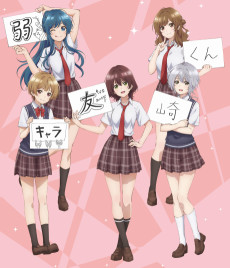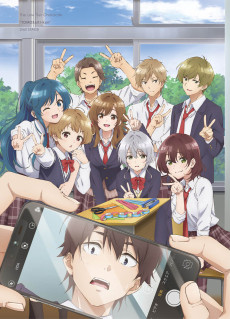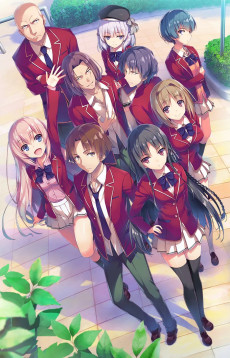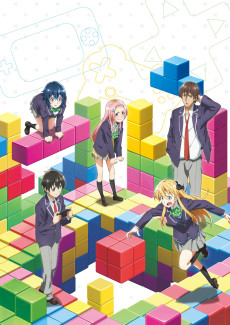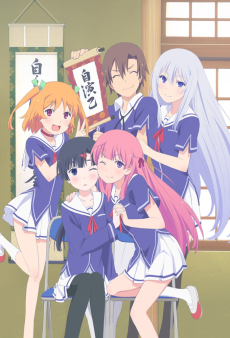JAKU-CHARA TOMOZAKI-KUN
STATUS
COMPLETE
EPISODES
12
RELEASE
March 26, 2021
LENGTH
24 min
DESCRIPTION
Expert gamer Tomozaki Fumiya doesn’t exactly fit in, but he wishes he did. With no written rules for success and gameplay that doesn’t work in his favor, the real world seems impossible for someone like him. But, like any noob, all he really needs are some strategies and a seasoned player like Aoi Hinami to help him. Hopefully with her guidance, Tomozaki will gain the experience he needs.
(Source: Funimation)
CAST

Aoi Hinami

Hisako Kanemoto
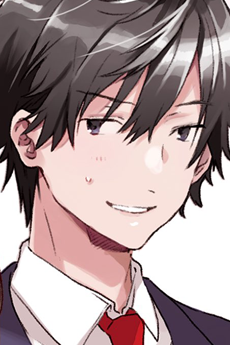
Fumiya Tomozaki
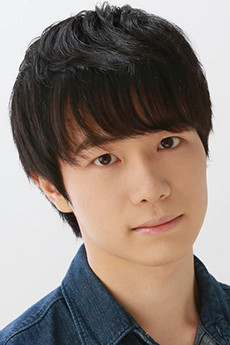
Gen Satou

Minami Nanami

Ikumi Hasegawa

Fuuka Kikuchi

Ai Kayano

Yuuzu Izumi
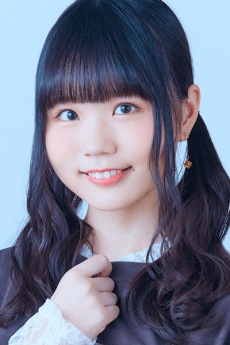
Nene Hieda

Tsugumi Narita

Akane Fujita
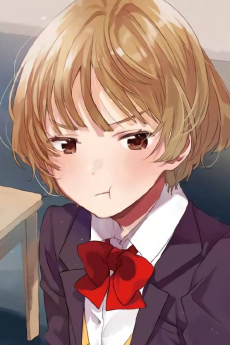
Hanabi Natsubayashi

Ryouko Maekawa
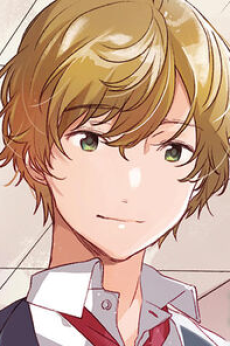
Takahiro Mizusawa
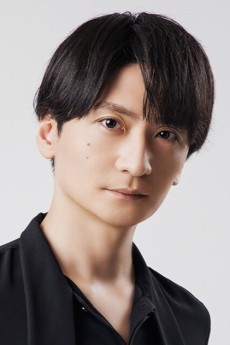
Nobunaga Shimazaki
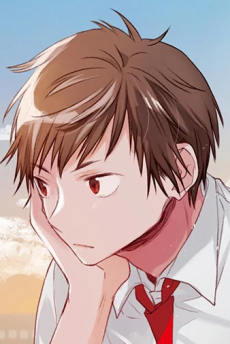
Shuuji Nakamura
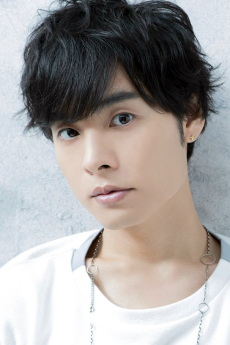
Nobuhiko Okamoto

Erika Konno
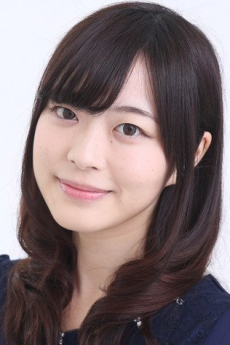
Sayaka Kaneko
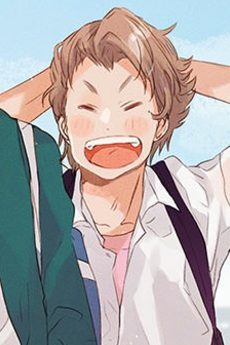
Takei
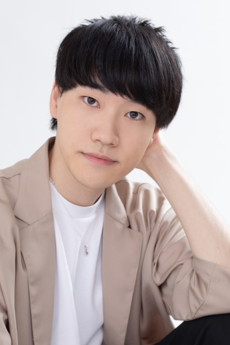
Shuntarou Mizuno

Tomozaki no Imouto

Rina Hidaka
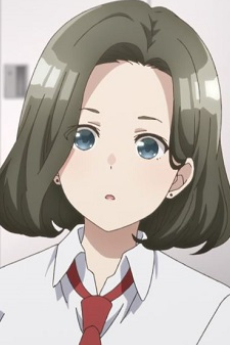
Mika Akiyama

Natsumi Hioka
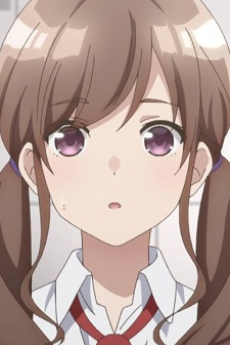
Mao Kamimae

Kana Ichinose
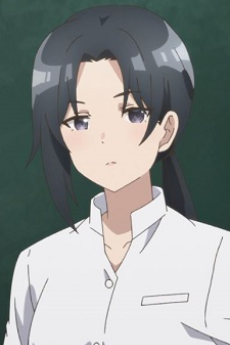
Kawamura

Yumi Uchiyama
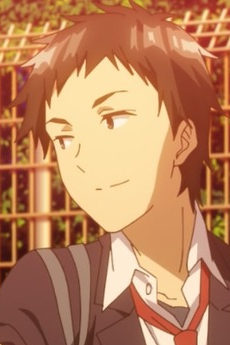
Daichi Matsumoto
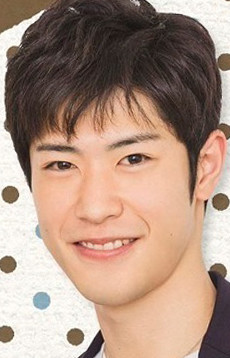
Takeo Ootsuka
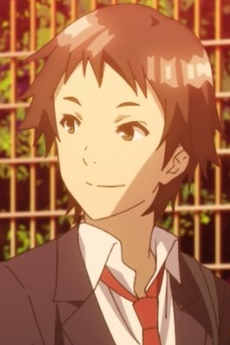
Kyouya Hashiguchi
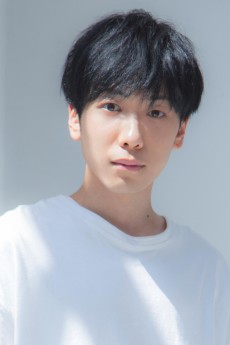
Kaito Takeda
EPISODES
Dubbed
RELATED TO JAKU-CHARA TOMOZAKI-KUN
REVIEWS

sadJoe
65/100Seems like a generic slice of life, but its gaming motif helps separate it from the genre's mold of recent memory.Continue on AniList__(this review does NOT contain any major spoilers)__ 
Bottom-Tier Character Tomozaki
This year’s winter season of anime has been a fulfilling and surprising one. There has been an incredibly decent selection of shows so far throughout 2021 (let's hope that the spring continues the trend). With all of the heavy-hitting shows this winter, it only makes sense that Bottom-Tier Character Tomozaki has been glossed over. Upon first glance, it seems like an average romcom/sol—which...it basically is. First impressions are sometimes accurate. I’d argue that there’s nothing wrong with a mid slice of life, but I’m aware that not everyone feels that way.
Bottom-Tier Character Tomozaki is not a bad show, but it isn’t great either. The anime does not possess an it factor. There isn’t much substance to draw in an audience. A show like this one often needs something unique about it for it to be convincing enough for people to watch it for an entire season. Though I haven’t really seen anyone criticize the anime outright, I have noticed quite a few people dropping the show. I attribute this to the boring atmosphere that the show tends to create; this is most palpable throughout the first few episodes. Although there is little to distinguish this anime from an average slice of life & rom-com, Bottom-Tier Character Tomozaki’s premise helps separate it from the pack.
Story
Fumiya Tomozaki is an “unpopular” high school student. Being one of the quiet kids that tend to keep to themself, Tomozaki doesn’t have many friends--if any at all. His life as a high school student isn’t the most enjoyable experience in the world. Due to these circumstances, he finds fulfillment and purpose in the exploration of his hobbies: video games, video games, and video games. Tomozaki is a gamer.
Not only is Tomozaki a gamer, but he is the number one ranked
FortniteTackfam player in the world. Tackfam--a game resembling Super Smash Bros--is where the protagonist takes refuge. Unable to fit in, he gives up on what he calls “the game of life.” There’s no instruction manual for life after all, so why even play? Having reached the point of giving up hope on the real world, there seems to be no hope for him playing the game of life. His pessimistic attitude begins to wither and evolve into something different though after a fateful encounter with a fellow “gamer." This gamer, who knows their way around both Tackfam and the game of life, offers to take Tomozaki under their wing while helping him make progress in the real world.Characters
Fumiya Tomozaki is the typical “loner” MC, just one of numerous protagonists of his kind. Even though Tomozaki is a distinct individual, the sol genre is plagued with similar characters. He is one of those guys that has zero confidence in himself. With his self-esteem being nonexistent, it causes him to view the world around him improperly. In essence, he’s a socially awkward teen with no life experience. I'm sure that he is a character that many can relate to in more ways than one. In Tomozaki's own words, he is “a noob...a player on level one in the game of life.”

The other characters that appear in the show are interesting enough, but they are capable of being boiled down to fit some overused tropes. The supporting cast of characters can be reduced to 4 [5] girls and 3 boys. The girls all vary on the dere spectrum. There's some tsunderes, a dandere, and a likely deredere. There's also a rivalry between a couple of the girls that goes back to their time in middle school. The competitive nature of this relationship is a key factor for some of the later plot points. I have zero issues with the female characters in the anime, as they are one of the main reasons that some of my boredom was able to subside while I watched the show.
The male side characters weren't enjoyable to see on screen, apart from maybe one. The guy that didn't peeve me to see on screen was the jokester/class clown type guy. Whenever he appears, he's always the source of comic relief. Though he doesn't show up much, he makes for some funny scenes. On the other hand, the remaining two characters are some of the main source of obstacles that Tomozaki has to face up against. The second character is a semi-bully that tends to lash out on Tomozaki, at times--particularly during the first half of the season. The last guy of is a pretty boy with a talent and knack for anything and everything. He's a fuccboi that everything comes easy for. Although he doesn't seem directly harm the MC, he says a lot of suspicious stuff in a tone that exudes arrogance. The creators made it easy for him to be disliked. Overall, the male characters are rather predictable, and they don't enrichen the story in the same way that the female supports do.

It's not my intention to roast the characters of Bottom-Tier Character Tomozaki. I just wanted to paint a portrait of what they look like on the surface. These characters aren't all that fleshed out, but that's perfectly acceptable. I didn't begin watching the anime under the impression that the characters would be super well-written. Though I wasn't exactly fond of some of the characters, they are definitely suitable for an anime like this. It would be a lot worse if there was no development for the characters. As the show progresses, both the side characters and protagonist get some development. With the past experiences of the side characters being hinted and revealed, it provides context for their otherwise unappealing traits. In addition, with almost each and every episode, Tomozaki accomplishes things that he never dreamed would be possible before he met the other "gamer." He makes genuine progress in his life, as he increases his social skills and becomes a more confident person.
Stop With the Metaphors, We Get It
If you dare to watch this show, be prepared for absolute "reddit moments." The use of the terms "gamer" and "normie" are thrown around in this anime more than every other show that I've ever watched combined. I realize that this a story about a gamer. It's obvious that the title itself sheds light on what is to be found in the dialogue of each episode. I expected the MC to apply his video game tactics to the real world, and I think it's cool how he's able to do conduct his thoughts in that metaphorical way. There comes a time though when enough is enough. I understood the concept midway through the first episode. I don't need to hear you use video game terminology to explain how it applies to "irl" every five seconds. This gamerspeak is cringe; it would be irresponsible of me not to mention this. If this is something that you can't handle, consider yourself warned.
Quality
There was nothing spectacular about the soundtrack for the anime. The OP really didn't suit my taste, and I found myself skipping it basically every week that I tuned in. It did feel pretty typical for the show. I liked the ED a little bit better; I listened to it all the way through a few times. The theme was a bit whack because it didn't seem to fit the mood/tone for certain dramatic scenes. I wouldn't be surprised if it got distracting for some people.
The animation for the show was decent. I had no strong feelings on either end of the spectrum. It seemed pretty fitting for a show of this caliber. It was the kind of generic animation that you'd find in an average sol show, but perhaps just a tad bit better than usual. It was solid enough, I'd say. The production team did a good job with it.
Conclusion
Bottom-Tier Character Tomozaki is kind of a dark horse for me. There were some things that I didn't like about the show. At times, it honestly felt like a chore to watch. The characters could honestly make-or-break the show for the audience. Some moments in the anime just seemed bland, while other scenes my eyes were glued to the screen and nothing could keep me from seeing what happened next. Despite its negatives, I kept returning to this show each and every week to see what would unfold in the life of Fumiya Tomozaki. For what it is, this anime executes its objective well. It's an average sol that subverts the “gamer” perspective, which helps the story stick out from the usual flavor of the genre.
Is this anime good?
Eh, probably notIs this anime bad?
Definitely notIs this anime cringe?
100%Is this anime worth watching?
I'd say so
enricoc01
85/100O que você quer fazer na sua vida?Continue on AniList__O que você quer fazer na sua vida?__ Sinto pena de quem dropou Tomozaki. Não falo isso com desprezo nem nada do tipo, mas vi várias pessoas sendo afastadas do anime por conta dos primeiros episódios, e que pena. Que pena mesmo. É uma obra tão incrível que o pessoal acabou deixando passar.
Mas por que eu acho Tomozaki tão incrível?
Vale lembrar que eu li a light novel e posso estar um pouco enviesado, mas tentarei me manter no anime.
Primeiro, é bom dar um contexto geral no anime. Basicamente, temos o protagonista, Fumiya Tomozaki, que é o melhor gamer do Japão num jogo chamado Atafami. Ele possuía um rival online, o segundo melhor gamer, chamado NONAME, e, após derrotá-lo várias vezes, eles marcaram de se encontrar na vida real.Chegando lá, ele descobre que NONAME na verdade é uma mulher chamada Aoi Hinami, que coincidentemente é a garota mais popular da escola do Tomozaki. Ela fica frustrada por ver que o melhor gamer era uma pessoa que desprezava o “jogo da vida” e, após discutirem, a Hinami consegue convencer o Tomozaki de que o “jogo da vida” é um dos melhores jogos existentes, fazendo com que o Tomozaki o experimente.
Em outras palavras, o Tomozaki não gosta da vida social e despreza as pessoas populares, mas a Hinami o fez mudar de ideia. E a partir daqui ele começa a melhorar como pessoa, mudando aparência, modo de falar, postura, sendo guiado pela Hinami.
Essa é a premissa. Uma pessoa solitária, que não possuía vida social ativa, que desprezava pessoas populares, e que agora está tentando virar uma pessoa popular, está tentando aproveitar a vida.
Uma das coisas que mais irritaram as pessoas foi a forma como o anime abordou isso, comparando vida social com jogos. Eu achei ótimo porque realmente faz sentido, mas muitos acharam cringe, e droparam.
Dado isso, a pergunta se repete: por que eu acho Tomozaki é incrível?
Se eu tivesse que dizer apenas uma coisa, seria o quão bem o autor consegue retratar um ambiente escolar. Já vi alguns slice of life escolares, e nenhum me pareceu tão real quanto Tomozaki.
O que me chamou muito a atenção nisso foi análise social que é feita desse ambiente. Relações sociais, hierarquia. O Yaku-sensei tocou em diversos desses pontos, e todos fizeram sentido! Quando eu assisti/li, muita desses pontos eram muito fáceis de ser visualizados na realidade. Eu fazia um “ah, então é por isso que era assim”
Por exemplo, a questão do mood e do que é certo e errado. É algo instintivo, e por isso nunca pensamos. Por que será que, numa escola, gostar de anime é errado? Isso é errado, ou é uma construção social? Será que não é que quem é popular não vê anime, e aí criou-se esse pensamento?
Não precisa ser só anime, pode ser com qualquer coisa. Quem está no topo dita as regras, e quem tá embaixo respeita. E isso no ambiente escolar é tudo, e nunca vi uma obra tocar nisso. Vocês nunca pensaram nisso? Pensem no cara mais popular na escola de vocês. O que ele fala não é quase sempre verdade? Mas será que é verdade? Ou o mood da sala torna aquilo verdade?
Outro exemplo dessa análise é na questão de como conversar. O Tomozaki copiou o estilo do Mizusawa de “provocar” as pessoas para tornar a conversa fluida. E isso funciona pq eu sempre fiz isso kkkkkkkkkkk. Você pega um “problema” que a pessoa tem e brinca com ela sobre. Por exemplo, eu tenho diabetes, então o pessoal me zoava por causa disso. Brincadeira saudável, sem passar dos limites.
No anime, brincavam com a Hinami por ela gostar de queijo, ou com a Mimimi ser “airhead”. Esse tópico em específico é abordado mais pra frente na novel, então pararei por aqui.
Tem várias outras coisas que posso falar, como conversas no zap, redes sociais, aparência, grupinhos e panelinhas, mas já deu pra notar que o aspecto social é absurdamente bem feito e muito bem estudado, então só por isso já vale a pena conferir.
E o que seria do ambiente escolar sem os estudantes, e como cada um se porta?Aqui é onde, na minha opinião, Tomozaki brilha. Como cada pessoa lida com as circunstâncias da vida? Como da pessoa encara os desafios em sua frente? Como cada pessoa pensa sobre isso? Usarei como exemplo alguns personagens.
Mimimi. Ela tem um arco apenas pra ela, e é nesse arco que eu me apaixonei por Tomozaki. Ela é caracterizada como uma garota brincalhona que era muito fácil de conversar, que não se abalava com nada. Mas não era bem assim...
O conflito interno dela era sobre sempre ser a número 2. É algo bem palpável para muita gente, pois todos somos minimamente competitivos. Todos nós já demos nosso melhor para atingir a liderança, mas nem sempre conseguimos e, pior, nem sempre somos reconhecidos. Mesmo sendo a número 2 em tudo: esportes, atletismo, popularidade, ela quase nunca é lembrada. Sempre lembram da Hinami, mas nunca dela, nunca. Mesmo ela tendo se esforçado. Mesmo ela tendo batalhado para isso. Mesmo ela dando seu máximo. E ninguém lembra. Os holofotes vão para a Hinami.
E não é assim na vida real? Quem lembra do vice-campeão de um torneio? Apenas o campeão é lembrado, por mais que o vice-campeão seja um excelente time também!
E, uma hora, você se cansa. No caso da Mimimi, ela nunca tentou ativamente confrontar a Hinami. Ela estaca tranquila apenas no 2 lugar, mas uma hora não dá mais para segurar. Você vai, ativamente, tentar ganhar a liderança. E foi o que ela fez: ela se candidatou à presidência do Conselho, junto com a Hinami. É uma postura muito corajosa da Mimimi, porque a adversária é a heroína perfeita. E isso não é algo fácil de se fazer. E tem algo a mais além disso. A Mimimi não mostra que está se forçando, muitas vezes chegando ao ponto de exaustão. E tudo isso porque ela queria derrotar a Hinami.
Acabei falando muito da Mimimi, mas ela merece. O Yaku-sensei trabalhou de forma muito madura uma das ansiedades mais presentes nos adolescentes hoje em dia, e eu valorizo muito isso! É muito palpável e compreensível. E a resolução desse conflito é magnífica! Me arrancou algumas lágrimas.
Outra personagem que gosto muito é a Izumi. Ela personifica uma mentalidade muito presente nos adolescentes também: a de que só aceita o que é dito. Sabe quando o pessoal na sala vota por alguma coisa, mas você não concorda. E o que você faz? Apenas aceita e não questiona. É exatamente isso que ocorre. A Izumi é o tipo de pessoa que apenas aceita o que é dito, que é levada pelo mood. Eu sou bem parecido com ela na real. É foda você querer falar que não concorda com algo e não falar por medo de ser julgado pelo mood que permeia o ambiente. Acho que todos, uma vez, já passaram por isso.
Agora, vou falar sobre 3 personagens pra poder exemplificar o título da minha review: O que você quer fazer na sua vida?
Primeiro, Tomozaki. Quem viu o anime, viu como ele mudou absurdamente. O discurso dele contra a Erika é o maior exemplo disso. Ele passou de uma pessoa que odiava o jogo da vida pra alguém que o experimentou e gostou! E a Erika cagou pra isso! Ela personificou a ideia de falar mal de algo que nunca experimentou e negar os esforços das pessoas, e isso enraiveceu o Tomozaki, porque ele é a prova viva de que esforços são capazes de mudança.Ele mudou seguindo as tarefas passadas pela Hinami. Uma delas em específico mexeu com ele, que era a de namorar a Kikuchi. Ele realmente gostava da Kikuchi? Era isso o que ele queria fazer?
Esses questionamentos vieram do Mizusawa. Ele era um personagem parecido com a Hinami, de ser “perfeito” e sempre conseguir o que queria. Mas houve um problema: ele gostava da Hinami. E ele se declarou pra ele, e foi rejeitado. Mas ele desistiu? Não. Sendo a primeira vez que ele não conseguia algo, ele tomou a decisão de perseguir seu sonho, de ativamente buscar o que ele queria. E isso mudou o pensamento do Tomozaki
Porém, isso ia contra os da Hinami. Ela priorizava o pensamento lógico e racional, não se importando com o sentimento das pessoas. Fazer o que você quer? Pffffffft, pra ela isso não existia. Havia apenas um caminho, que era o caminho de sucesso, racional e lógico.
Eles discutem e bla bla bla, até o final que é quando o Tomozaki fala pra ele que ele vai provar, que você pode ter sucesso na vida buscando o que você, de fato, quer fazer!E essa é a mensagem que eu tiro de Tomozaki. O que você quer fazer na sua vida? Você quer seguir um caminho que te leve para o sucesso, mesmo negando seus desejos e vontades pessoais? Você quer focar nos seus desejos e não no caminho de sucesso? Você quer tentar ambos?
E é isso. Resumindo, Tomozaki é uma ótima representação do ambiente escolar, sendo extremamente fiel ao que o compõe e retratando de forma madura as consequências disso e em como cada estudante é afetado. Não só isso, é uma ótima história que nos ensina que esforço traz resultado, e que só reclamar na cadeira que a vida é ruim não vai adiantar de nada.
Então, sim, vale a pena ver Tomozaki e recomendo a todos que vejam. De quebra, vocês podem ir ler a light novel também hehe.

nflstreet
80/100While it looks generic, Tomozaki's message of self-improvement is pertinent in our increasingly-isolated societyContinue on AniListTomozaki has been compared and contrasted with many anime of its same nature. I’ve seen it be compared to Oregairu, solely for the fact that they’re both coming-of-age stories about a high schooler that slowly breaks out his shell and learns how to make friends. There’s also anime like Gamers!, Bunny Girl Senpai, and Oresuki, where there’s not that much in common except they both are slice-of-life rom-com. While Tomozaki might seem like a rehash of the ‘loser becomes popular, girls start to like him’-type of anime, it isn’t a derivative of any of the aforementioned anime. Back when I was reviewing the first few volumes of the light novel, I compared Tomozaki to an infamous and controversial book from the mid-00s, called ‘The Game’.
In The Game, Niel Strauss, the author, first learns, and then dives deep into the PUA (Pickup Artist) community, eventually meeting up with some of them. Strauss, throughout the book, learns how to ‘pickup women’ effectively, which ranges from learning how to ‘talk to women’, to learning how to emotionally manipulate them into having sex with you. What does Tomozaki have in common with this? The whole premise of the series revolves around Tomozaki taking advice from someone who has treated life like ‘a game’, and promises to show him how life can be fun after you ‘gamify’ it.

_"Do you have any szechuan sauce left?"_ The person who promises to show Fumiya Tomozaki the fun in highschool life is Aoi Hinami. At the beginning of the anime, Hinami is shown to be your prototypical popular high-school girl—that is, until they accidentally meet up with each other not knowing who’s who. Tomozaki (nanashi), who’s on top of the ‘Attack Families’ game (a Smash clone) leaderboard, gets invited to meet up with the number two player, Hinami (NO NAME), after playing a few online games and discovering that they live close to each other. Tomozaki’s GameStop fit and terrible posture triggers Hinami into calling Tomozaki “a loser who’s going nowhere in life” and “[...] garbage without the slightest spark of ambition”. While being harsh, Hinami does have a point. Tomozaki has never attempted to break out of his shell, and as a result, has no friends in school and derives all of his enjoyment from playing games. Tomozaki’s understanding of how ‘real life’ works is that people like Hinami have ‘high base stats’ while people like himself are ‘bottom-tier characters’. Of course, this is true to an extent, but this is more decided by your socio-economic position rather than by your parents messing up your stats while giving birth to you. With unknown motives, Hinami decides to show Tomozaki how she looks without makeup, showing him how you can ‘improve stats’ and how his fatalist outlook on life is self-defeating. Hinami, knowing that Tomozaki grinded his way to being the top of the Atafami leaderboard, knows he is capable of working towards goals and offers to teach him “[...] the rules of this game one by one.” Tomozaki, being enticed by Hinami treating life ‘as a game’, takes up her offer.
Most of Hinami’s ‘tips’ to Tomzaki are common sense, such as buying new clothes that look good on you, having better posture, attempting to reach out to classmates to talk to them, and getting a haircut that makes him look like he takes a shower more than once a week. She also has ‘tips’ for him that range from strange, like wearing a mask and pretending to have a cold in order to ‘practice his smile’ under the mask, to straight-up weird, like practicing ‘conversation starters’ on index cards like how someone would study vocabulary for an upcoming test. They meet up before and after school in order for Hinami to give Tomozaki ‘goals’, some short-term like ‘talk to the girl that sits beside you in class’, to medium-term like ‘finding a girlfriend’. Shaping these goals like RPG quests, while still being daunting to a loser like Tomozaki, further pushes Hinami’s narrative of treating life as a game and gives him something to work towards, making him feel like he’s making progress. Yes, this is a strange way to attempt to push yourself out of being a loser, but it does help Tomozaki, so it’s good for one thing at least.
While I’ve been mean to Tomozaki for most of this review so far, I’ll give him credit for one thing—once he puts his mind to something, he can find unique and useful ways to succeed. Whether it is Atafami, ‘de-geeking’ himself, or various other things, such as becoming the ‘brain’ of an election campaign. While Tomozaki is easy to understand, Hinami is a very mysterious person. Little is known about her and her backstory; all we know about her is that she’s the best at everything she puts her mind to (except for Atafami, which Tomozaki is better at). Unlike other girls that are ‘the best at everything’, it’s clearly stated that Hinami wasn’t born into being who she is, and has worked around the clock to become who she is. Her motive behind her tireless drive of being on top isn’t known in the anime, but it’s clear that she views life as something to be the best at, not something you should enjoy. The only reason she even cares about Tomozaki is because he always bests her in Atafami, no matter how much she practices. There is an idea of Aoi Hinami. Some kind of abstraction. But there is no real her. (While Hinami is nowhere near as psychotic as Patrick Bateman, it is funny to see the two compared.)

_"I have to return some videotapes."_ Along with Tomozaki and Hinami is a supporting cast that is sometimes hard to keep up with, due to how many are introduced in a small amount of time. Thankfully, the supporting cast sticks around and aren’t tossed away once they’re not important for the plot anymore. Going from female to male order, our first side character is Yuzu Izumi. Izumi is the girl that Tomozaki has to ‘talk to three times’ to attempt to acquaint himself with her. They form a friendship after she requests that he teach her how to play Atafami, since her crush plays it. Minami Nanami (known as ‘Mimimi’) is from what I can tell the most popular side character. She is an energetic and cheerful girl that is persistent (although not as much as Hinami) at track and field (and formally basketball). What separates Mimimi from Hinami is that Mimimi is a lot more sincere and less cynical than Hinami. She’s a hard worker, but is a lot more emotionally driven and vulnerable. She’s very friendly to everyone, even to outcasts like Tomozaki and her best friend Hanabi Natsubayashi (known as ‘Tama-chan’). Unlike Mimimi, Tama is quite abrasive, to the point where it gets her in trouble sometimes. She’s similar to Tomozaki in the way that they were unsociable (Tama’s only friend was Mimimi while Tomozaki had no one at the beginning of the anime). Her small stature and irritable nature make her an easy target of Mimimi’s hug attacks on her. Last, but not least, for the girls is Fuuka Kikuchi. While Kikuchi is also in the same class as Tomozaki, they often talk in the library while during lunch breaks. She’s a ‘fairy-like’ reserved bookworm that loves the books of ‘Michael Andi’, which I thought was originally a pseudonym for Stephen King, but now think is just a made-up name. She’s an aspiring novelist who becomes friends with Tomozaki over Michael Andi books. Kikuchi isn’t that connected with any friend group involving other characters, but is on good terms with everyone. Moving on to the fellas; Shuuji Nakamura is the first character to be introduced in the anime. He challenges Tomozaki to a set of Atafami, which turns into multiple after he refuses to believe that he’s not as good as Tomozaki. He’s overly competitive and shown to be quite temperamental, especially when it comes to Atafami. He is the one that Izumi has a crush on, being unaware of it while at the same time having a crush on her. Takahiro Mizusawa, whose good friends with Nakamura, is as level-headed as Nakamura is overly-aggressive. He is an aspiring beautician whose smooth-talking and good looks making him attractive to girls. He’s the closest thing to a ‘role model’ that Tomozaki has, seeing how popular he is. Mizusawa is a perceptive person, being the first person to notice (other than Tomozaki’s sister) that Tomozaki was intentionally trying to make himself more popular (“You read a de-geekification book!”) Other side characters that play small roles are the ring-leader Erika Konno and the goofball Takei.

_"Woobwoobwoobwoob! Say, what's the big idea, sneaking up on me!"_ When I started the light novel last year, I thought Tomozaki was just going to be generic wish-fulfillment garbage that was somehow more popular than other generic wish-fulfillment garbage. I admit it now that I had the wrong assumption about the series. The closest it gets to being ‘wish-fulfillment’ is the fact that someone as ‘perfect’ as Hinami would go out of her way to help Tomozaki in the first place. Once I realized what motives Hinami might have, then it became clear that she isn’t doing this to satisfy the reader—rather, she’s doing this out of self-interest. I gave the first volume a two out of five stars, mostly due to how cringe-worthy Tomozaki can be. In light novels, you get to see more of Tomozaki’s inner monologue, which is a double-edged sword. Tomozaki’s inner thoughts are agonizing to read since he’s a young man that’s analyzing social situations like he’s playing a video game. Is that normal? No, it isn’t. Usually when a loser like Tomozaki starts analyzing life as ‘a game’, it means that they’re up to no good. Tomozaki though is a very genuine person. He sees this as an opportunity to integrate into the real world. Sure, getting a girlfriend would be nice, but he doesn’t want to become a two-timing player. That would be antithetical to his character.
A theme that takes a while to come up, but is important to the series, is the question ‘Do I really want to do this?’. Does Tomozaki really want to ‘master the game of life’, or does he want to just stay being the best at Atafami online. In Tomozaki’s case, getting out of his comfort zone and learning that there’s a whole world outside of video games is invaluable. He doesn’t have the same drive to be on top of the social ladder as Hinami though, which sometimes puts them at odds. While they both love games, and love treating life as one, Tomozaki and Hinami have drastically different opinions on how one should live life. While Hinami may be feeding him bad info on what the purpose of ‘mastering the game of life’ is, at least she was kind enough to show Tomozaki how to do so in the first place. From what we know, Tomozaki didn’t have anything going for him except for his skill in Atafami before meeting Hinami. Without his chance encounter with Hinami, he would probably waste his time in high school, playing games and being socially withdrawn, and would spend his time at university the same way. If he wasn’t given this opportunity, there’s no telling if he would ever get out of his bubble. Even if Hinami’s outlook on life is overly-cynical, she’s given Tomozaki a way to enjoy life outside of video games, which is invaluable.

_A master at work_ What saves Tomozaki from becoming a monster is his moral compass. If he was a guy that wanted to become a ‘lady-killer’, he could use Hinami’s teachings to manipulate girls into liking him, causing this series to be a harem instead of a slice-of-life show with rom-com elements. I’m sure Hinami would help him with that if he was interested. But Tomozaki doesn’t see the point of asking out a girl that he doesn’t like, so he could never do that. Bringing back up the book ‘The Game’ I mentioned in the beginning. While it shows the glamorous lifestyles that ‘professional’ PUAs live, it also shows how vapid their lifestyle really is. Once you make having sex with as many women as you like your most important goal in life, you lose your soul and the ability to see women as anything else but playthings. Throughout the book, the readers can sense how this ‘PUA training’ requires you to see women as lesser beings that are meant to be conquered. Other than the whole emotionally manipulating women thing, it’s the biggest tragedy in the book. The problem with books like The Game is that it leaves readers (mostly young men who are unsatisfied with their life) wanting to live the same life Strauss lives in the book, even knowing what it does to a person’s brain. Of course, there’s nothing wrong with wanting to learn how to be more confident and outgoing. What books like The Game end up doing however is ‘either unintentionally or intentionally’ promoting a lifestyle that is morally bankrupt and transactional. I would also apply this to Mark Manson, or any other ‘self-help’ author, books, but I haven’t bothered to read any of them. The only reason I bothered to read The Game was because back in the day, men on image-boards would tell others to read it every day—it was to see what the hell they were trying to inflict on my teenage brain. All of this relates to Tomozaki because this series has inspired some young men to get out of their rut and try to stop being a ‘loser’. While it isn’t completely against anything PUA-related, it’s more of a ‘young man learns how to reintegrate into society’ series rather than a ‘young man learns how to bang several women’ series.

_Tomozaki learning how to use hair product from Mizusawa_ What I like about Tomozaki is that it’s shown that above all, what got Tomozaki to ‘de-geek’ his life is gain some self-confidence. Even if he still puts himself down, the fact that he isn’t moping around all the time is a definite step up. Of course, Hinami’s help was essential in this. Getting a haircut, buying and wearing ‘trendy’ clothes, and other tips helped ‘normify’ himself, but nothing fundamentally about his character has changed. To state it like I think how Tomozaki would; while his ‘character’ has the same skill set, everything got buffed. He doesn’t need to invent a whole new persona to be able to relate with others—all he needs to do is make an attempt to connect with his classmates. I believe that this lesson is important to young men who may have a misunderstanding that you need to completely rework your personality when it comes to relating to others. Of course, being a spineless twerp is undesirable, but behaving like someone you aren’t to try to impress others is just as unnatural and off-putting. It’s hack to say this, but ‘being yourself’ is the best course to go (unless if you’re a detestable person). Perhaps I’m only one of the few people that came away from the Tomozaki series with this interpretation, but I hope others can see this as well.

_"Damn I clean up good"_ If you’ve gotten this far into the review, you’re probably wondering “Does this guy think there’s anything bad about Tomozaki?”. The answer is yes, I do have some complaints. My first one has to do with Tomozaki being ‘the best’ at Atafami. The fact that he’s never reaped the benefits of being the best, like going to tournaments and winning prizes, or even being sponsored, is quite odd. I can excuse Hinami from not doing this, since while she would probably love to go to a competition to stomp everyone she faces, being known as a top-rated Atafami player isn’t one of her top goals. The only logical reason I can think of is that he’s an ‘onliner’, or someone who’s only good when playing online, and nowhere near as good when playing on the same console. I’m not that much of an ‘Atafami’ player, but from what little I know, being the best online isn’t anywhere near the same as being good at LANs (you could say this about any online competitive game though). Maybe the potential fame and chance to be embarrassed scares him away. Or he’s afraid that he’d look like a weirdo there. To his defense, ‘Atafami’ players (Western ones at least) are quite known for being unhygienic, so he wouldn’t look too out of place there. The premise of Tomozaki and Hinami being first and second on the Atafami leaderboards in Japan, respectively, is still a bit absurd, but I can forgive it on the basis that Yuuki Yaku, the author of the original light novel, had to have a basis for Tomozaki and Hinami to meet. Perhaps I would’ve gone with ‘best at his school’, or ‘best in his prefecture’, but it doesn’t matter that much. The animation is middling as well, but not bad enough to put me off.
Another thing that makes the show hard to watch at times is Tomozaki’s inner monologue. I know the only thing he can relate social climbing to is ‘leveling up’ in video games, but it does get grating to hear him continuously make references to ‘leveling up’ and ‘gaining EXP’ in relation to real-life situations. Other than it being painful to watch, it portrays gaining friends and becoming more popular as an overly transactional thing. To Tomozaki’s defense, this is the only way he can portray this to himself, and Hinami, the queen of social climbing, pushes him to think this way. As I stated earlier, he uses his new-found ‘skills’ to become less lonely and gain friends, which I can’t blame him for. He’s a good guy that unfortunately became a ‘loner’ due to misconceptions that manifested in his mind. By the way, these inner monologues are more cringeworthy in the light novel, so be prepared if you decide to read the light novel.

_Cock watching_ At the end of the day, the Tomozaki series has an increasingly important message to its fanbase of young men (and women too). Young adults today, in America at least, are increasingly more disconnected from the outside world and have no life outside of the internet and work/school. This has been exasperated by the pandemic, which made it impossible for many young people to safely go to social outings (go to bars, attend parties, go on vacation with friends, etc.) There’re many reasons for this, ranging from the rise of indoor entertainment, the lack of belief in the future of our planet, or, most likely, just not ever learning to make friends. These are reasons in America, but they could as easily be the same for Japan. What I respect the most about Tomozaki is that the message it sends. That your standing as a ‘bottom-tier character’ isn’t something that’s set in stone. That with some self-improvement, such as ‘cleaning up’ and attempting to talk to others around you, you can increase your self-confidence, and in return be able to ‘rehabilitate’ yourself in society. While this is way easier to do as a teenager than as an adult, it’s still possible. The message in Tomozaki is also way less cynical than the message in any PUA or self-help book. Tomozaki doesn’t trick anyone into being his friend—they enjoy the little dweeb for how passionate he is about Atafami and other things he sets his mind towards. Hinami on the other hand IS a deeply cynical character, but she and Tomozaki serve as good foils to each other, showing that there’s more than one way to skin a cat. I’m perhaps one of the only people that got this message out of it. Without it, I think that I would consider Tomozaki an average show. Even without the message, Tomozaki is a fun show to watch. If you’re into slice-of-life rom-coms, then you’ll like Tomozaki. It isn’t that much like Oregairu or anything else that I've seen people compare it to, but it’s still an enjoyable watch. And if you enjoy the anime, be sure to read the light novels, since the anime only adapts the first three volumes, and (as of me writing this) six volumes have been officially translated and released.
SIMILAR ANIMES YOU MAY LIKE
 ANIME ComedyNHK ni Youkoso!
ANIME ComedyNHK ni Youkoso!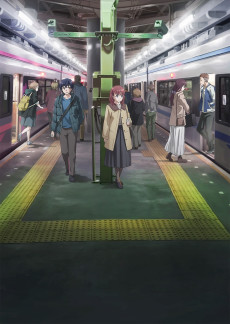 ANIME DramaJust Because!
ANIME DramaJust Because!
SCORE
- (3.5/5)
TRAILER
MORE INFO
Ended inMarch 26, 2021
Main Studio project No.9
Trending Level 1
Favorited by 1,872 Users
Hashtag #友崎くん



